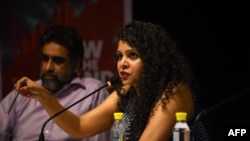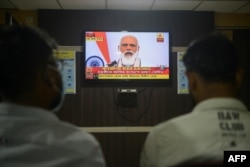Arshi Qureshi was "auctioned" on the Bulli Bai app, where many Muslim women and girls were offered "for sale," and even though the app was shut down after widespread condemnation, intimidation and online trolling against her have not ceased.
"I am quite often abused on social media if I put up a tweet or post criticizing the ruling regime," Qureshi told VOA.
As a journalist, Qureshi says, it's her job to report on social and political issues affecting her country, India, but she finds doing so increasingly difficult and risky.
"I've realized I can't be silent. This is what they want. They want to silence vocal Muslim women's voices," she said.
Qureshi's is not the only case.
This week, United Nations-appointed independent rights experts issued a statement calling on Indian authorities to stop systematic harassment against a prominent Indian Muslim journalist.
"Relentless misogynistic and sectarian attacks online against journalist Rana Ayyub must be promptly and thoroughly investigated by the Indian authorities and the judicial harassment against her brought to an end at once," the statement said.
Ayyub has been targeted for her consistent reporting on women's rights, government accountability and the situation of religious minorities in India.
"They call our existence, our reportage, our opinions as insignificant but unleash all their favorite anchors, prime time shows, twitter trends, right wing ecosystem, propaganda websites and leaders to defend themselves against a journalist," Ayyub wrote on Twitter on Tuesday.
Media under fire
Over the past few years, India has ranked as one of the most dangerous and restrictive countries for journalists in the world.
Of the 27 journalists killed in different parts of the world in 2021, five documented deaths occurred in India, according to the Committee to Protect Journalists.
And despite its secular and democratic status, India is ranked 142nd — next to Myanmar and Pakistan — in the Reporters Without Borders (RSF) 2021 World Press Freedom Index.
"Ever since the general elections in the spring of 2019, won overwhelmingly by Prime Minister Narendra Modi's Bharatiya Janata Party, pressure has increased on the media to toe the Hindu nationalist government's line," RSF said.
In addition to facing increased public harassment, Muslim journalists, particularly women, are also exposed to discrimination at their workplaces.
"Even within the large Indian media companies, there is kind of a glass ceiling for many Muslim journalists, … that they had been discriminated against inside many of the big publications," Steven Butler, Asia program coordinator at CPJ, told VOA.
The risks facing free media in India also undermine the country's democratic institutions.
"You cannot have democracy without freedom of the press," Butler said.
Majoritarian politics
India is the world's most populous democracy, and about 14% of its 1.4 billion people are Muslim, but human rights groups say the country has become increasingly intolerant and at times even threatening toward them.
These groups blame the ruling Bharatiya Janata Party (BJP), including Modi, for stoking Hindu-Muslim tensions.
"The BJP government at both central and state levels have adopted laws and policies that discriminate against minorities and vulnerable communities, especially Muslims," Jayshree Bajoria, a senior researcher with Human Rights Watch, told VOA.
As millions of Indians cast votes in seven state legislative elections, including in the most populous state, Uttar Pradesh, some Hindu religious groups have reportedly stoked religious sentiments for political gains.
In recent weeks, BJP political rallies have included threats of mass violence against Muslims, and some party leaders have labeled Muslims as terrorists.
And a new law banning Muslim girls from wearing hijabs at educational centers has led to protests and closures of schools in the southern Indian state of Karnataka.
The hijab ban "is the latest example of Indian authorities increasingly seeking to marginalize Muslims, exposing them to heightened violence," Bajoria said.
For the journalist Qureshi, the fight for hijab is not just religious.
"Hijabi Muslim women are fighting for their constitutional right — rights that are being snatched away in a democratic country," she told VOA.
While Modi has not publicly commented on his party's policies regarding Indian Muslims, he claimed at an election rally this month to have the blessings of Muslim women.
Modi was quoted in Indian media as saying: "We freed Muslim sisters from the tyranny of triple talaq (divorce). When Muslim sisters started supporting the BJP openly, these vote mongers became uneasy. They are trying to stop Muslim daughters from progress. Our government stands with Muslim women."






